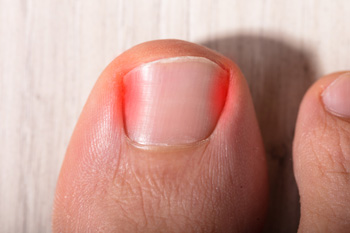1648 US Highway 130
North Brunswick, NJ 08902

An ingrown toenail is when the corner of the toenail grows into the surrounding skin. This typically happens to the nail on the big toe from improper nail cutting and it can be painful. There may be redness, a hardening of the skin, and swelling around the nail. If an ingrown toenail is not tended to, it can bleed and foul-smelling pus may ooze from it. An infection can also develop, which can spread to underlying bones. Those who have reduced circulation to the feet, such as people who are diabetic or who have peripheral arterial disease, may be more prone to developing ingrown toenails. An infection from a bacteria or fungus can come from an ingrown toenail. Those with risky underlying conditions may find it harder to heal which may lead to severe complications. If you have an ingrown toenail and it is painful or looks like it is infected, it is strongly suggested that you see a podiatrist for immediate treatment.
Ingrown toenails may initially present themselves as a minor discomfort, but they may progress into an infection in the skin without proper treatment. For more information about ingrown toenails, contact Dr. Robert Fink of Brunswick Foot & Ankle Group. Our doctor can provide the care you need to keep you pain-free and on your feet.
Ingrown Toenails
Ingrown toenails are caused when the corner or side of a toenail grows into the soft flesh surrounding it. They often result in redness, swelling, pain, and in some cases, infection. This condition typically affects the big toe and may recur if it is not treated properly.
Causes
You are more likely to develop an ingrown toenail if you are obese, have diabetes, arthritis, or have any fungal infection in your nails. Additionally, people who have foot or toe deformities are at a higher risk of developing an ingrown toenail.
Symptoms
Some symptoms of ingrown toenails are redness, swelling, and pain. In rare cases, there may be a yellowish drainage coming from the nail.
Treatment
Ignoring an ingrown toenail can have serious complications. Infections of the nail border can progress to a deeper soft-tissue infection, which can then turn into a bone infection. You should always speak with your podiatrist if you suspect you have an ingrown toenail, especially if you have diabetes or poor circulation.
If you have any questions, please feel free to contact our office located in North Brunswick, NJ . We offer the newest diagnostic and treatment technologies for all your foot care needs.